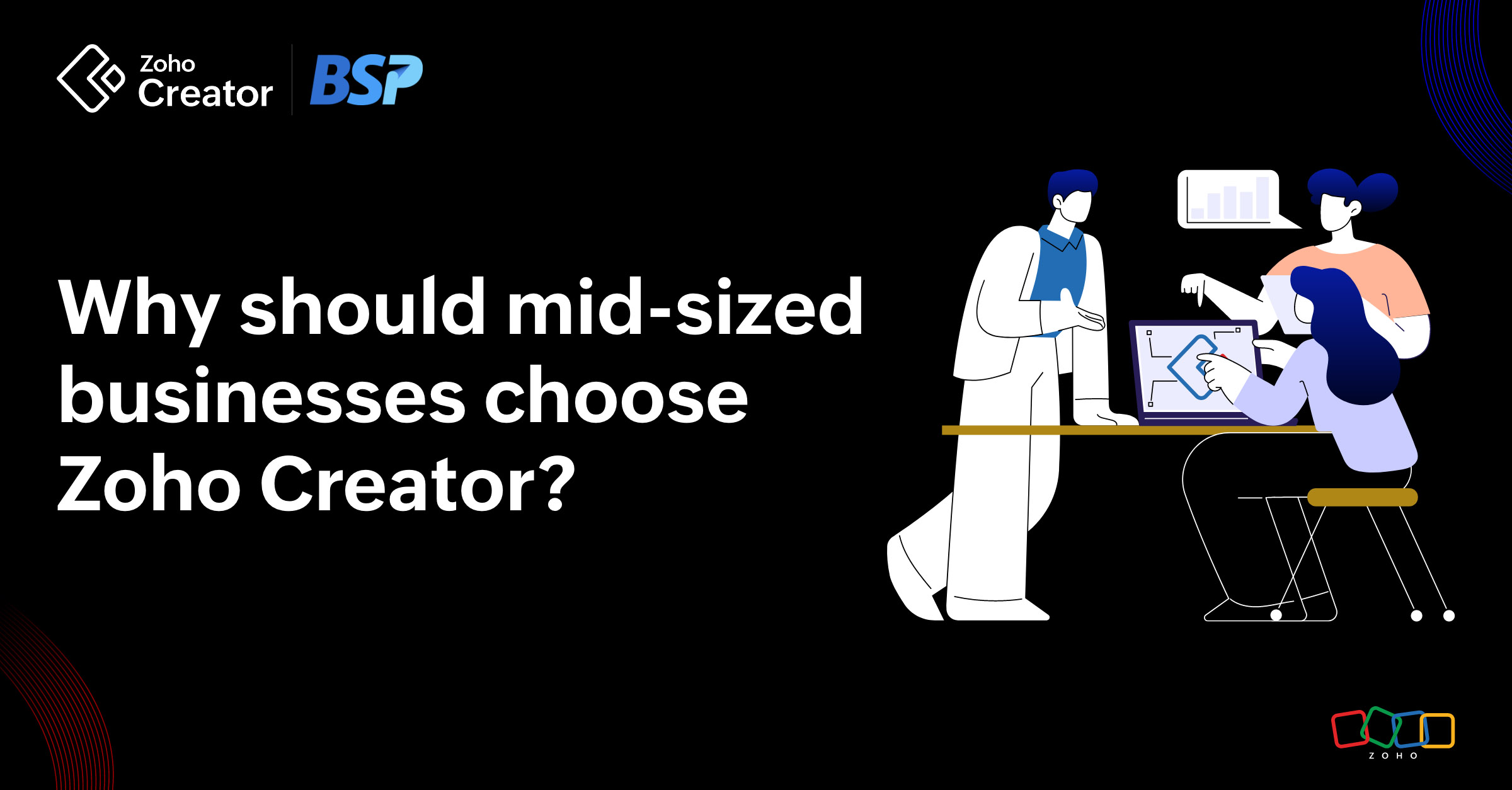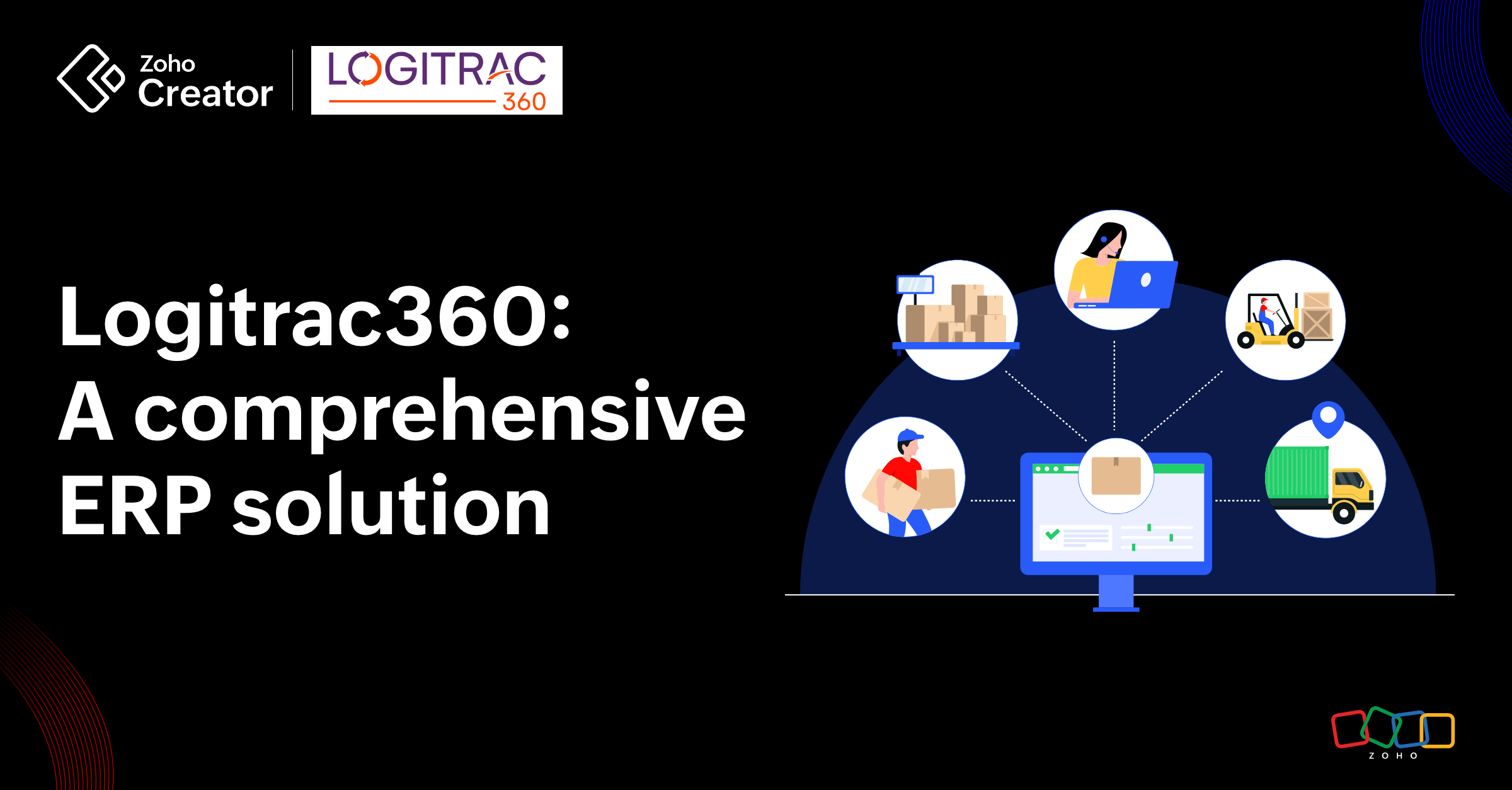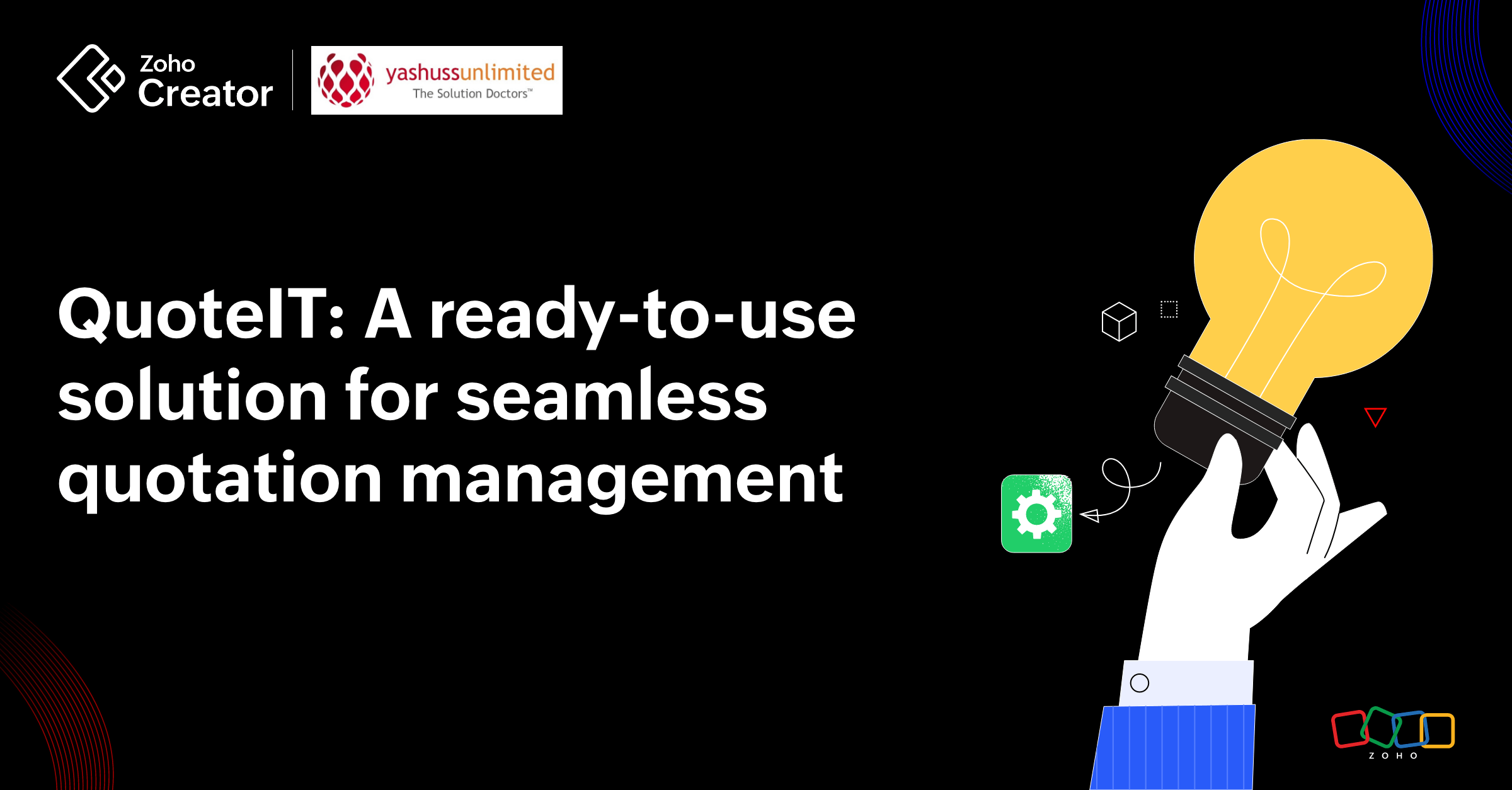- HOME
- Create Your Way
- 8 low-code solutions to empower your business
8 low-code solutions to empower your business
- Last Updated : April 20, 2023
- 1.1K Views
- 8 Min Read

What is low-code?
Low-code is an app development approach that enables you to create an entire application, from the ground up, with little to no coding knowledge. It not only assists your company in digitizing processes but also in delivering them promptly, which boosts development, deployment, and productivity.
Why low-code?
Low-code development makes it simpler than ever to create customizable apps for both business users and developers. It also greatly reduces development time by automating manual and redundant processes.
How do different industries leverage low-code?
Low-code apps are now used by a wide range of industries, including software, education, retail, and logistics, just to name a few. Today's market demands that businesses adjust faster to change, so the need for rapid application development tools is crucial. As companies drive digital transformation, they need solutions that connect teams, automate processes, streamline workflows, reduce time to market, and enable easy access to data. Low-code platforms enable businesses to create these solutions with less time and effort. From custom ERP software for manufacturing to the development of comprehensive educational software, we've come a long way.
Now that we've looked at the what, why, and how of low-code, it's time to address the crucial question that revolves around the entire ideology of low-code and low-code solutions.
Can low-code be a game-changer for your business?
Absolutely! Continue reading to learn how your business can leverage low-code to build a variety of solutions that fit your needs.
What type of low-code solutions can your business build?
Low-code platforms have evolved a lot since their inception, and include various features and capabilities that enable businesses to create powerful enterprise apps in less time.
So what can be built with low-code? Well, quite a lot. Let's go into the various types of solutions you can build using low-code platforms: from fully digitizing your business to creating AI-powered apps and self-service portals.
Digital transformation
The process of integrating digital technologies to transform a business or service—either by replacing non-digital or manual processes with digital processes or by replacing older digital technology with newer digital solutions—is known as digital transformation. Low code platforms provide an environment in which businesses can create apps using simple user interfaces and features such as guided scripting and drag-and-drop.
Here are some of the main advantages of low-code in digital transformation:
Faster go-to market
Increased productivity and efficiency
Enhanced customer experience and collaboration
Lower costs
Improved customer engagement
But do organizations really need digital transformation?
Yes, they do.
The pandemic fiasco exemplifies this, as the majority of businesses were forced to go digital, whether they liked it or not. The whole notion of digital transformation is now deemed critical by all businesses, regardless of size. Digital transformation not only assists organizations in keeping up with emerging customer demands, but it also assists businesses in remaining operationally efficient during any disruption caused by events like the pandemic.
Legacy modernization
Legacy modernization is the process of updating or enhancing an enterprise's existing digital platform with the help of state-of-the-art solutions that can support future digital efforts. Application modernization is essential and necessary to stay up to date and keep customers informed on the latest changes.
Legacy modernization is crucial for businesses, because maintaining a modernized system not only guarantees automation of internal processes, but also improves productivity and customer satisfaction. When done correctly, modernizing a legacy system yields almost immediate benefits, such as:
Increased revenue
Improved productivity
Enhanced business agility
Up-to-date software
Cost savings
Modernizing legacy software has always required a lot of effort and money. However, this can be solved with a low-code platform. It covers everything from faster delivery to agility and reusable data models.
When is the right time for legacy modernization?
Instead of replacing old legacy systems with new software, many companies are choosing to modernize them. Modernizing legacy applications offers the best of both worlds and benefits both businesses and consumers—and low-code development is the best choice among the many options available for doing it.
Workflow automation
Does your organization also put a lot of effort into manual processes? Is there a way to automate repetitive tasks to save time and money? Enter workflow automation. The process of automating a set of actions to perform a task with minimal human intervention is known as workflow automation. With low-code workflow automation software, you can create custom workflows, streamline communication, and efficiently automate day-to-day operations. As companies compete more than ever based on their ability to leverage data and operate efficiently, tools like low-code satisfy the ambition of decision-makers when it comes to the digital transformation of organizations and departments.
Here are some of the key benefits of workflow automation:
Reduced errors
Increased compliance
Saved time
Enhanced visibility
By creating custom workflows, low-code allows businesses to automate a chunk or all of their operational activities on the go. Moreover, low-code provides features like integrated dashboards and analytics, seamless integration, and more, all from a single place, which will empower your business and boost productivity and revenue.
Business process management (BPM)
Business process management (BPM) uses various approaches to discover, model, analyze, measure, improve, and optimize business processes. It looks at the current situation and suggests ways to improve it, in order to make the organization more efficient, effective, and productive. BPM software is enterprise-level process automation software for automating repetitive tasks, managing basic processing, eliminating bottlenecks, and more.
Here are some of the ways a business can benefit from using BPM software:
Workflow automation
Digital transformation
Simple integration
Reduced data redundancy
Increased agility
Low-code BPM platforms combine low-code development tools with business process management capabilities. Business users can build applications, deploy them quickly, and accelerate the automation of business processes seamlessly. With BPM software, different areas of your organization can benefit, from the HR department to the sales and marketing teams.
BI & Analytics
Business intelligence (BI) combines augmented and collaborative analytics, data visualization, powerful integrations, and best practices to help enterprises make data-driven decisions. BI helps you overcome uncertainties by anticipating trends and requirements and finding opportunities to help your company grow and generate revenue.
With BI you can create and personalize:
Reports
Dashboards
AI
Integration
Self-service portals
Utilizing BI and analytics features on low-code platforms enables businesses to make more insightful decisions. Instead of building and deploying models, the process is driven by autonomous technology that produces amazing results. BI supports every department at your company, from sales to customer support analytics, with easy-to-understand visualizations to make more informed business decisions faster.
AI-powered apps
Low-code platforms enable businesses to create fully functional AI support solutions, without hiring expensive AI professionals or software developers. AI-powered apps using low-code are an artificial intelligence game changer that allows companies to use AI capabilities to create and launch intelligent business applications without writing complex code. Organizations can take advantage of modern ML techniques, such as predicting outcomes, interpreting feedback, evaluations, and support tickets, eliminating data entry, extracting keywords, and recognizing objects.
Why do organizations need AI-powered apps for their businesses?
Organizations can leverage AI to work more intelligently by meeting critical requirements, like automating business workflows, gaining actionable insights, and engaging with customers and employees. Organizations can implement near-instantaneous monitoring capabilities with the help of AI's ability to take in and process massive amounts of data in real time. When organizations incorporate AI technologies into their processes, they can expect a reduction in errors as well as a stronger adherence to established standards.
Low-code platforms are the best way for enterprises, especially SMBs, to leverage other high-tech innovations, such as big data, IoT infrastructure, robotics, machine learning, and more to meet their specific needs. The combination of low-code development and artificial intelligence allows businesses to remain digitally competitive.
Integration
For businesses that use low-code platforms, easy integration with old and new systems is paramount. Low-code integration also has a significant impact on demanding business indicators, API reusability, and more. With the help of low-code, you can easily connect your core business systems without any information gaps. Business and IT teams can also leverage low-code platforms to make their day-to-day activities seamless. All they have to do is set triggers, add actions, and view the entire organizational workflow in the builder, without writing a single line of code.
Self-service portals
Customer portals are the basis of excellent customer service. These service portals optimize the end-user experience by providing a simple and intuitive user interface that allows you to request a wide range of services through a single system. They meet customer demand for self service while also freeing up your contact center. Online customer portals are also an important productivity tool and experience element.
Self-service portals add a variety of benefits to your business, including:
Consolidated services
Saved time
Improved customer acquisition
Community building
Self-service portals allow users to interact directly with the customer support team and manage relevant data, such as policies, invoices, deliveries, orders, and online payments. With reusable modules and out-of-the-box workflows, you can build your customer portal app in days instead of weeks. From a dedicated portal designer to maintaining your brand identity and customizing notification settings, you can have it all in one place.
The future of app development
Companies around the world have turned to low-code to meet the demand for business transformation software and address challenges. Some of the most common challenges low-code addresses are a lack of technical skills, shadow IT, technical debt, time, and money.
As traditional coding becomes increasingly difficult and expensive, low-code platforms are stepping in to pick up the slack. To customize an application using a traditional development approach, developers have to painstakingly write code, which is very time-consuming. With a low-code platform, though, it’s much easier to quickly create a customized app—which is why it's gradually becoming a natural part of the software life cycle.
What does "low-code" mean to developers?
It's a common misconception that low-code and no-code replaces developers. But in reality, low-code development solutions help businesses get rid of obstacles. It enables business users to create solutions they need on their own, without completely relying on overworked IT teams. Developers with extensive programming knowledge add value to organizations, and can use low-code to create complex workflows rapidly.
By 2024, low-code application development will be responsible for more than 65% of application development activity. - Gartner, Inc
Low-code is here to stay, and with it, companies now have the tremendous ability to transform their businesses, make an immediate impact, and stay up-to-date with current market trends with ease.
Zoho Creator is a low-code pioneer that offers an intuitive development platform that enables companies in all industries to turn ideas into applications and drive rapid growth and competitiveness.
Get started on your low-code journey with a 15-day free trial of Zoho Creator.
 Aishwarya
AishwaryaAishwarya is a content marketer at Zoho. Apart from creating content, she loves to read and watch sci-fi and crime thrillers, travel, and basically can't survive without coffee.



